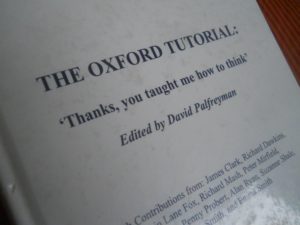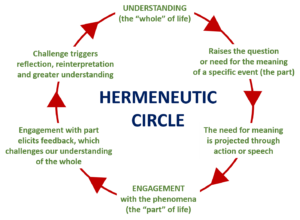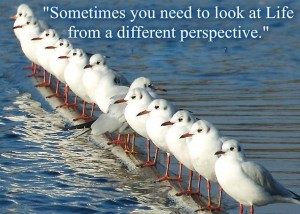Joy of Teaching
Teaching is an increasing part of our job. The greatest joy of teaching is the working together with young people while jointly exploring the world around us. It gives us great satisfaction, to see how students, slowly but surely develop their academic attitude, and curiosity, and how they are intellectually inspired by what they see and discover. This is a joint effort. So as a lecturer we are not the all-knowing expert, telling  the students what the truth is, but at best a good colleague, who happens to have a bit more experience and overview, by means of which we can stimulate, help, support, tutor and coach our students in their own discovery endeavour in the world of geographical knowledge. From this perspective I clearly favour the Oxford Tutorial System of teaching, even though we, at Dutch universities, do not have the resources to apply this to the extreme, and have developed a more realistic but also more modest version of that didactic ideal. Here it pays to be a relatively small programme. Small in this case equals Quality. Of cause in the first years of our Bachelor programme we tend to teach more hands-on and in large groups by necessity also a bit more frontal, but when the years progress, especially also in the Master programme we more and more become
the students what the truth is, but at best a good colleague, who happens to have a bit more experience and overview, by means of which we can stimulate, help, support, tutor and coach our students in their own discovery endeavour in the world of geographical knowledge. From this perspective I clearly favour the Oxford Tutorial System of teaching, even though we, at Dutch universities, do not have the resources to apply this to the extreme, and have developed a more realistic but also more modest version of that didactic ideal. Here it pays to be a relatively small programme. Small in this case equals Quality. Of cause in the first years of our Bachelor programme we tend to teach more hands-on and in large groups by necessity also a bit more frontal, but when the years progress, especially also in the Master programme we more and more become  professional colleagues of our students, and are in similar ways thrilled by our learning successes or embarrassed if we did not succeed. But even the latter experiences are usually very instructive. In general the primary goal of the tutorial system is that we teach our students to thinks for themselves.
professional colleagues of our students, and are in similar ways thrilled by our learning successes or embarrassed if we did not succeed. But even the latter experiences are usually very instructive. In general the primary goal of the tutorial system is that we teach our students to thinks for themselves.
See also the brief video of Prof. Richard Dawkins on why the Oxford Tutorial System greatly influenced his life: https://www.youtube.com/watch?v=r8Th4WtKpDY
Breadths vs. Depth
Although geography is a very broad discipline and covers extremely diverse topics and aspects of the world around us, we cannot teach our students all the nitty gritty details of about almost ‘everything’. We need to focus. But in doing so, we need to educate our students so called key skills, or ‘meta-competences’. So while they focus on specific topics, theories or methodological approaches and learn from us how to deal with them, they should in the meantime also develop the skills to do the same things on their own, when focusing on topics, theories or methodologies we cannot include in our teaching programme. In this way, we can provide enough depth in teaching the topics we focus on, while at the same time still be confident that our graduates have the breadth and ability to tackle almost any kind of  problem they might come across in their further professional career. I denote the didactical principle of this approach as the Exemplary Hermeneutic Principle. According to this principle, we first give our students an overview of the whole spectrum of topics, theories or methodologies available, so that students can orient and position themselves in that field. To get an overview, you do not need to have very detailed knowledge of every single topic, theory or methodology yet. At this stage we are providing the necessary Breadth. Then in the next step we would chose an exemplary topic, theory or methodology, and develop a more in Depth insight in that specific topic, theory or methodology, by following a Hermeneutic Circle. At the same time students need to reflect on their own skills and methodology of thus in depth exploring of the unknown phenomenon in question, so that they can conduct the same techniques when they in future address new unknown topics.
problem they might come across in their further professional career. I denote the didactical principle of this approach as the Exemplary Hermeneutic Principle. According to this principle, we first give our students an overview of the whole spectrum of topics, theories or methodologies available, so that students can orient and position themselves in that field. To get an overview, you do not need to have very detailed knowledge of every single topic, theory or methodology yet. At this stage we are providing the necessary Breadth. Then in the next step we would chose an exemplary topic, theory or methodology, and develop a more in Depth insight in that specific topic, theory or methodology, by following a Hermeneutic Circle. At the same time students need to reflect on their own skills and methodology of thus in depth exploring of the unknown phenomenon in question, so that they can conduct the same techniques when they in future address new unknown topics.
This principle allows to build a specialised curriculum, without loosing the possibility of applying our knowledge to the full breadth of our discipline, and therefore allows to deliberately leave gaps (in German one would say “Mut zur Lücke…”), for the sake of more in depth knowledge on exemplary topics, without loosing quality. I believe that this is a much more useful strategy than building a curriculum which tries to cover it all but in the end provides almost nothing of everything. A curriculum like that would never deliver the in depth analytical insights we need to effectively address future societal problems.
Geography focusing on the urgent issues of today
Geographers want to make a difference in this world!! They are usually very engaged in solving the most topical of current societal problems. We only need to open the newspaper of today or watch the latest news on television, and the geography of all these issues ranges on all sides. We therefore typically focus on these topical issues, both in the specialised tracks of our Bachelor programme, but especially also in the different Master Specialisations. Of course they all share a broad intellectual tradition in our discipline as well as neighbouring disciplines and thus are not to seen as closed silo’s of specialised knowledge, but each of them focuses on specific topical issues. Geography as a discipline as such is therefore not that important (reality can anyhow not be divided in disciplines), but contributing to solution of current societal problems, by means of in depth scientific insights, is what occupies us. The origin of all our research endeavours is a practical societal problem. This of course also reflects in our educational programme. I living geography closely linked to the geography of everyday life on local, regional, national and global contexts. It is our engagement with these issues which drives and inspires us and is the core of our passion for geography as a science.
Critical geography
 This engagement for a better world, is also the basis for a critical approach, critical about current situations which call for improvement and progress and which call for an emancipatory approach for underprivileged groups, but also critical about our own approach and contribution to the solution of these problems (see also Habermas, 1968, “knowledge and Human interests”). Also geographers do not have a patent on the truth, and we are well aware that there are always different perspectives on the same problem. In our curriculum I therefore am very keen on showing the plurality of approaches, and try not to be dogmatic. This is probably also a typical characteristic of geography in general. In contrast to some other disciplines — which as the word already says, are very disciplined and focused on a single dominant paradigm and hardly allow any alternative views — geography in inherently multi-paradigmatic, and very much involved in critical constructive debates about the plurality of these different approaches. Taking a well underpinned position in these debates is one of the things I want to invite our students to.
This engagement for a better world, is also the basis for a critical approach, critical about current situations which call for improvement and progress and which call for an emancipatory approach for underprivileged groups, but also critical about our own approach and contribution to the solution of these problems (see also Habermas, 1968, “knowledge and Human interests”). Also geographers do not have a patent on the truth, and we are well aware that there are always different perspectives on the same problem. In our curriculum I therefore am very keen on showing the plurality of approaches, and try not to be dogmatic. This is probably also a typical characteristic of geography in general. In contrast to some other disciplines — which as the word already says, are very disciplined and focused on a single dominant paradigm and hardly allow any alternative views — geography in inherently multi-paradigmatic, and very much involved in critical constructive debates about the plurality of these different approaches. Taking a well underpinned position in these debates is one of the things I want to invite our students to.
Research orientation
Of course we could help to solve urgent societal problems in many different ways. As a university and academic educational programme, I feel strongly committed to a research oriented approach. Not because I think that all our graduates will become professional researchers, but rather because I believe that if our students explore those issues they are most interested in, in depth, the best way to do so is by doing (critical) research on that topic. This does not only allows the development of in depth  knowledge but also develops the analytical skills, which I believe an academic needs to float to the surface and raise above the average in the long term in the students’ later professional career. We want to educate our students to become the intellectual and moral leaders of the future.
knowledge but also develops the analytical skills, which I believe an academic needs to float to the surface and raise above the average in the long term in the students’ later professional career. We want to educate our students to become the intellectual and moral leaders of the future.
This does not come by itself, it demands a strong investment in for example the development of methodological skills, and the development of the ability of abstract thinking, and to change perspective. So, clearly, our contribution to the solution of pressing societal problems is mainly a scientific contribution.
